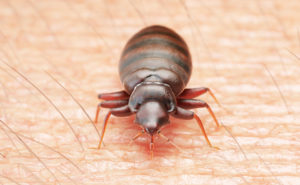
PHOTO: SCIEPRO/SHUTTERSTOCK.COM
Bed bugs (Cimex lectularius) are attracted to humans for their bloodmeals because of our natural odors, the carbon dioxide we exhale, and our general warmth, but it turns out they don’t like to stick around long on our skin. That’s the latest finding from a study done by the University of Kentucky (UK) in Lexington.
“Our latest research shows the reason they do not stay on humans like other pests, such as lice, is due to lipids or triglycerides in our skin that cause them to leave their hosts and hide in nearby locations, such as beds and mattresses,” Dr. Zach DeVries, assistant professor of urban entomology with the UK College of Agriculture, Food and Environment, said in a news release. “Our findings were consistent across all triglyceride types, all participant groups and all bed bug populations. Bed bugs nearly always preferred the control filter strip to the one containing skin triglycerides.”
Drs. DeVries and Sudip Gaire, a UK post-doctoral scholar, tested this latest finding by rubbing a strip of filter paper on participants’ skin to collect samples. Research participants represented numerous ages and ethnicities. They also tested the theory on multiple populations of bed bugs raised in the lab and collected in the field.
“The bed bugs do not like to sit on skin triglycerides and refuse to stay on surfaces that contain triglycerides,” Dr. Gaire said in the news release. “We got tremendous results by using only a small amount of triglycerides.”
Dr. DeVries said the findings could have big implication for the professional pest control industry, including being used “to deter bed bugs from hitchhiking on people’s belongings, thus reducing their spread.”
Additional study researchers include Russell Mick, Rick Santangelo and Dr. Coby Schal from North Carolina State University, and Grazia Bottillo and Emanuela Camera from the San Gallicano Dermatological Institute in Rome, Italy. The findings were first reported in Scientific Reports.
Leave A Comment